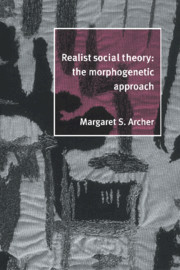Book contents
- Frontmatter
- Contents
- List of figures
- Acknowledgements
- 1 The vexatious fact of society
- Part I The problems of structure and agency: four alternative solutions
- 2 Individualism versus Collectivism: querying the terms of the debate
- 3 Taking time to link structure and agency
- 4 Elision and central conflation
- 5 Realism and morphogenesis
- Part II The morphogenetic cycle
- Index
5 - Realism and morphogenesis
Published online by Cambridge University Press: 02 December 2009
- Frontmatter
- Contents
- List of figures
- Acknowledgements
- 1 The vexatious fact of society
- Part I The problems of structure and agency: four alternative solutions
- 2 Individualism versus Collectivism: querying the terms of the debate
- 3 Taking time to link structure and agency
- 4 Elision and central conflation
- 5 Realism and morphogenesis
- Part II The morphogenetic cycle
- Index
Summary
Social theory has to be useful and usable: it is not an end in itself. The vexatious fact of society has to be tackled in theory and for practice. These two tasks cannot be separated, for were practical utility to be the sole criterion we would commit ourselves to instrumentalism – to working with theoretically ungrounded rules of thumb. Conversely, a purely theoretical taming of the vexing beast may give a warm inner glow of ontological rectitude but is cold comfort to practical social analysts. They want a user-friendly tool kit and although it cannot come pocket-sized with an easy reference manual, customer services have every right to complain when handed an unwieldy device without any instructions on the assumption that if they handle it sufficiently this will somehow sensitize them to something.
Yet, because social theorists have fought shy of ‘emergence’ we are very short indeed of concrete exemplars, that is of ways of approaching the vexatious fact of society which are based four-square upon the acknowledgement of its emergent properties. Instead, there is a glaring absence of bold social theories which uncompromisingly make ‘emergence’ their central tenet. With the exception of Lockwood's seminal though incomplete attempt to beat a pathway, others have laid a few more paving stones before losing their nerve and heading back for shelter in either the Individualist or the Holist camps.
- Type
- Chapter
- Information
- Realist Social TheoryThe Morphogenetic Approach, pp. 135 - 162Publisher: Cambridge University PressPrint publication year: 1995
- 3
- Cited by



